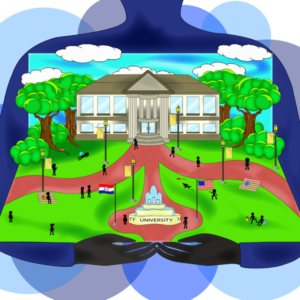Author Note
John Saltmarsh, Department of Leadership in Education, University of Massachusetts Boston.
Correspondence regarding this introduction should be addressed to John Saltmarsh, Professor of Higher Education, College of Education and Human Development, University of Massachusetts Boston. E-mail: john.saltmarsh@umb.edu

The rubric that serves as the basis for this special issue originated as a response to problems of practice in a college within a university. As a community partner once commented, what we need is less evidence-based practice and more practice-based evidence. The design of the rubric was practice-based, and the colleges that participated in a pilot study of its implementation have provided evidence of its efficacy in advancing community-engaged scholarship at the college level.
The authors of the lead article in this special issue brought their knowledge and experience in community engagement to the college-level engagement project. The process began with a conversation in Mike Middleton’s office about how the College of Education and Human Development at the University of Massachusetts Boston could be more supportive of the community-engaged scholarship that many faculty in the college were either doing or interested in doing. Mike Middleton was the dean of the college. I was a faculty member in the college directing a center on the study of higher education and, through the center and my own scholarship, was deeply involved in the community-engagement movement in higher education nationally and internationally. I was also directing the Carnegie Foundation’s Community Engagement Classification, focusing on institutional engagement, and had directed a national project at Campus Compact in the early 2000s focused on “the engaged department.” Melissa Quan was both a doctoral student in the college’s higher education program studying the impact of community engagement on communities and a seasoned practitioner directing a campus center for community engagement, working in the weeds of institutionalization every day.
The conversation was based on our experiences. Mike’s own research had been community-engaged, and he had come to UMass Boston from a campus that had centralized infrastructure supporting faculty engagement but, as do many research universities, had struggled with fully institutionalizing community engagement. Mike had come into an institutional environment where, as dean, he encountered hesitation about, if not resistance to, community engagement at the same time faculty in his college were gravitating toward it. The key question he raised was, What would it mean to be an engaged college and not focus efforts solely on trying to change the institution? His question was provocative and ripe for interrogation. Melissa and I were somewhat skeptical of focusing on the engagement of a college within a university, in part because the literature (and our own work) highlighted the importance of institutionalizing community engagement at the university level or driving it into departments, closer to the core work of the faculty.
The answer to the question of what it would mean to be an engaged college emerged with the rubric. With its academic, faculty-centric focus, the dimensions and components of the rubric focus on community-engaged scholarship (engaged scholarly work across the faculty roles of research, teaching, and service). The dimensions of the rubric are grounded in the literature and resonate with the experiences of practitioners. The rubric was initially tested by colleagues who led community engagement work on their own campuses and was further refined.
This special issue includes articles by authors affiliated with three of the colleges that participated in the rubric pilot study. Mike, Melissa, and I are grateful to them for their participation, thoughtfulness, and careful inquiry into the use of the rubric. A few of the common findings across their articles include the following:
- Community-engaged scholarship in a college is core academic work, requires faculty input and buy-in, and can shape the culture of a college.
- College-level engagement requires administrative leadership from the dean but also from associate deans and department chairs.
- Focusing on the college as the unit of engagement revealed, as one campus noted “asymmetry of structure or fragmentation of efforts between the campus as a whole and the college.” Putting a spotlight on the college catalyzed a re-evaluation of university-wide engagement efforts.
- Engagement in a college is not a substitute for institutional engagement, but deeper college engagement can enhance wider institutional engagement, particularly if multiple colleges align their policies, practices, and culture with a commitment to community-engaged scholarship.
- The rubric revealed ways community engagement is evolving, or as one college noted, it “revealed that new types of issues, concerns and approaches arose.”
- One of those issues is what is often referred to as “alignment”—how college, department, and institutional engagement efforts were aligned across the campus.
- The rubric highlighted that mentoring is most effective as a college activity, focusing on disciplinary clusters within a college. The distinction here is that many institutional centers have mentoring programs, but often the mentor is from a different college than the mentee.
With the assistance and support of the editors at the eJournal of Public Affairs, the entire rubric is made available for public use through this special issue. Readers should refer to the rubric as they read the articles in this issue. We hope that other colleges will find it useful, implement it in ways that make sense for them, adapt it as needed for their organizational environment, and share stories and outcomes to advance the work.
The editors also want to thank the other contributors to this special issue. Jason Jolley provides an inspiring look at how the Voinovich School of Leadership and Public Affairs at Ohio University (i.e., a school-level unit) has embraced applied public service as a form of economic engagement and, in doing so, has revised faculty reward policies to create incentives for faculty to provide applied, research-based expertise to community challenges. The editors would be pleased to see school-level units like the Voinovich School adapt and implement the college engagement rubric as a way to assess the depth and pervasiveness of their engagement efforts.
It may not seem obvious that the book review by Star Plaxton-Moore, which introduces readers to the important work of the British philosopher Mirada Fricker, is directly related to college-wide engagement. However, an exploration of epistemic injustice has direct relevance for community-engaged scholarship and scholars. Fricker’s work, Epistemic Injustice: Power and the Ethic of Knowing, asks readers to examine and respond to—as does the rubric and the reward policies at the Voinovich School—the impact higher education systems have on privileging certain knowledge, what research is legitimized, and who gets to participate in the creation and spread of knowledge. Plaxton-Moore’s review highlights how Fricker’s work foregrounds identity and power in an analysis of ethics and justice countering default system processes that silence and delegitimize certain knowers and ways of knowing, creating epistemic exclusion. An epistemic justice lens asks stakeholders to strategically shape institutional cultures, structures, and practices to identify and address prejudicial exclusion of scholars from participation in the spread of knowledge through credibility discounting and epistemic marginalization.
Similarly, the Fallows’ book Our Towns: A 100,000-mile journey into the heart of America, reviewed in this issue by Keith Morton, may not appear to be aligned with higher education community engagement. Morton’s keen insights underscore the importance, related to any campus work with communities, of focusing on the assets and cultural wealth of localities if those campuses are to collaborate in small ways that can assist in producing long-term change. Our Towns is not about higher education but about how communities across the United States respond to local challenges and create meaningful, affirming change. Their stories make it clear that colleges and universities can play a role in improving community life. This requires humility and persistence, something perhaps not well attended to in many community engagement efforts.
It also requires deep compassion. The last of the book reviews, by Brian Obach, honors the legacy of Peter Kaufman, a dedicated teacher in the sociology department at the State University of New York at New Paltz. Kaufman’s book, Teaching with Compassion: An Educator’s Oath to Teach from the Heart, was published just months before Kauffman’s untimely death. Teaching with Compassion is the culmination of decades of reflection on, research about, and practice of teaching and learning. Just as the Fallows, in Our Towns, do not minimize challenges, divisiveness, and the way larger, even global, problems are manifested locally, Teaching with Compassion does not minimize the struggles created by the educational system, frustrating the best efforts of dedicated teachers. Yet, in both books, communities in one and students in the other, if viewed as collaborators with knowledge, expertise, and cultural wealth, can be co-producers of vibrant democracy and deep learning. It is the role of those in higher education to help create, with unbounded compassion, what bell hooks called “radical spaces of possibility” in teaching and in communities. That may be the highest form of engagement.
Finally, the special issue editors want to thank not only the journal editors, but also the American Association of State Colleges and Universities for their partnership on the college engagement project. They also want to thank the University of Massachusetts Boston for supporting this project through a research grant.
Author
 John Saltmarsh is Professor of Higher Education in the Department of Leadership in Education in the College of Education and Human Development at the University of Massachusetts, Boston. John publishes widely on community engaged teaching, learning, and research, and organizational change in higher education, including the co-edited book Publicly Engaged Scholars: Next Generation Engagement and the Future of Higher Education(2016). He is the co-author of the Democratic Engagement White Paper (2009) and Full Participation: Building the Architecture for Diversity and Public Engagement in Higher Education (2011). John is a Distinguished Engaged Scholar at the Swearer Center for Public Service at Brown University, where he leads the project in which the Swearer Center serves as the administrative partner with the Carnegie Foundation for elective Community Engagement Classification. He is also a Visiting Scholar with College Unbound in Providence, Rhode Island.
John Saltmarsh is Professor of Higher Education in the Department of Leadership in Education in the College of Education and Human Development at the University of Massachusetts, Boston. John publishes widely on community engaged teaching, learning, and research, and organizational change in higher education, including the co-edited book Publicly Engaged Scholars: Next Generation Engagement and the Future of Higher Education(2016). He is the co-author of the Democratic Engagement White Paper (2009) and Full Participation: Building the Architecture for Diversity and Public Engagement in Higher Education (2011). John is a Distinguished Engaged Scholar at the Swearer Center for Public Service at Brown University, where he leads the project in which the Swearer Center serves as the administrative partner with the Carnegie Foundation for elective Community Engagement Classification. He is also a Visiting Scholar with College Unbound in Providence, Rhode Island.
